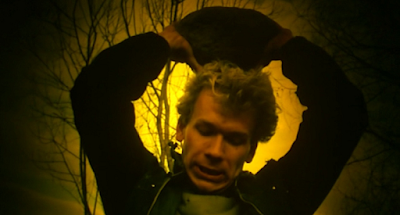The fifth instalment of The Dekalog films is direct, brutal and chilling. The commandment used as the inspiration for this film is "thou shall not kill", and it is the horrific killings around which the plot of Dekalog 5 revolves that have earned the collection a "15" certificate in the UK. Certainly there has been nothing I can recall up to this point which has been above a "12", with even the more adult themes being mostly alluded to rather than depicted.
The plot of Dekalog Five centres on the strange anti-social behaviour of a young man, as he wanders the streets aimlessly. While some scenes show hints of his humanity; at other times he seems to gain some grim satisfaction from inconveniencing, humiliating, hurting and finally killing others. The murder he commits is senseless, premeditated, and carried out upon a random victim who has not earned his victim status by being either especially odious or virtuous; but by simply just by being there.
The unfolding action in the city streets around the
Dekalog flats, is interspliced with the career development of an idealistic young lawyer, working his way up the ladder and preparing to defend his first accused person. Inevitably the two stories will collide, and they do, as the young man is caught, convicted and sentenced to death. The idealistic defence lawyer, asks the judge if the prisoner will die because of any errors on his part; but is assured that his speech was the best denunciation of the death penalty that he had heard, but nevertheless, the law stands. The lawyer's desperate attempts to save the life of the young sadistic murderer, come to nothing - and they spend a final half hour together before the sentence is carried out.
The execution is set up to be something similar to the original murder. It is planned, organised, thought- through and all the horrible weapons of death assembled. Like the murder, the execution for all it's planning, is a violent, frantic and ghastly business, in which pleas for mercy are ignored and the frenzy of killing is followed by a noxious silence. Unlike the hangings of Pierepoint (depicted in the movie starring Timothy Spall), in which hanging was conducted with scientific accuracy, speed and with an strange efficiency, this was a matter as horrible as the crime it sought to repay. The credits roll to the sound of the lawyer weeping and yelling, "I abhor it, I abhor it!" The viewer is drawn inevitably to the same conclusion.
It is fascinating that the Polish communist authorities permitted this film to be made and shown on TV, at a time when the Polish State still had the use of Capital Punishment at its disposal. While the rates of executions was a tiny fraction of what it had been under the Stalinist post-war regime, it was still many years before the end of such practices. Dekalog Five was obviously Krzysztof Kieślowski's attempt to hasten its' demise.
Dekalog Five is horrible, nasty, and powerful as a result. It is noteworthy that Kieślowski's
anti-execution polemic doesn't suggest that the man was innocent; he wasn't. He doesn't suggest that the man was pleasant but unfortunate, he doesn't hint that there was an irregularity in court procedures or that this was a crime committed in self-defence. Krzysztof Kieślowski rather wants the viewer to see that even when a nasty man, commits a nasty crime, without compassion and for no reason; killing him is still not the appropriate response of the state. Asking the viewer to sympathise with the criminal, or to excuse him in some other way, would have detracted from the power of the point he was making. In fact the supressed humanity of the murderer only begins to re-surface in his final minutes.
The filming of Dekalog Five is interesting. The Dekalog Flats feature less than in the other film in the series, in that we see the victim leave the flats, but most of the action takes place away from them at the murder scene, and then in courts and prisons. It is also filmed in a very grimy low light, not in black and white, but an almost ghostly black-and yellow; which casts a mournful shadow over the entire length of the piece. Lengthened and reworked, this episode came to a wider audience as "A Short Film About Killing". It is powerful, intelligent and provocative filmmaking, essential viewing even though the instinct is to want to look away from the screen, again and again.





















